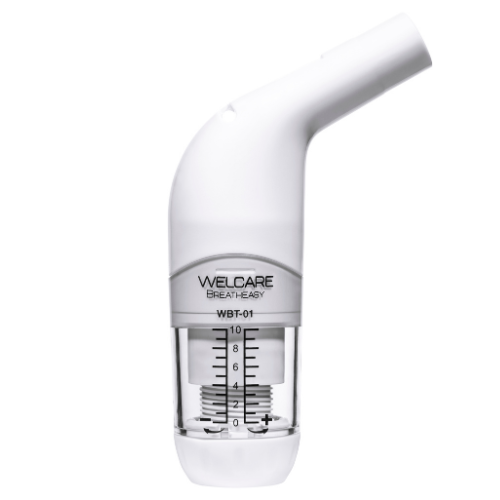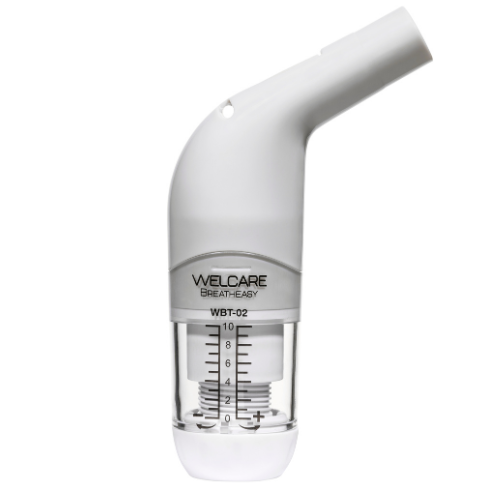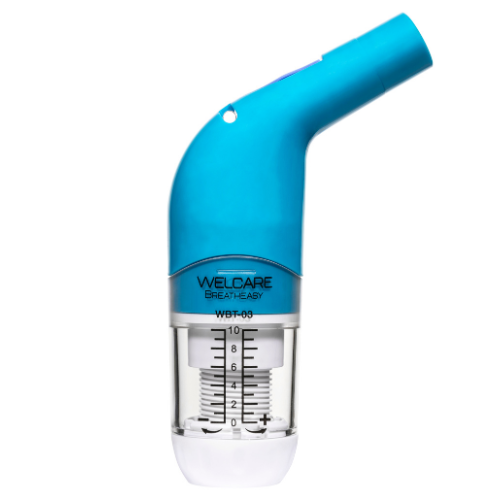FREE SHIPPING OVER $99
- Home
- Blog
- Fitness & Lifestyle
- The science behind inspiratory muscle training

The science behind inspiratory muscle training
The scientific concept of inspiratory muscle training
Have you ever considered the concept of breathing training? Despite initial reservations, examining the science of inspiratory muscle training reveals benefits for athletes and individuals with some respiratory ailments.
What is Inspiratory Muscle Training? A basic definition
Inspiratory Muscle Training (IMT), also known as Respiratory Muscle Training, or Breathing Training is a form of resistance training that focuses on strengthening the muscles used for breathing, including the diaphragm and intercostal muscles resulting in increased respiratory function.
For many years, athletes have used this type of training to enhance their respiratory performance and give them that ‘edge’ over their competitors. However, recent studies have shown that it could also be beneficial for individuals with some types of respiratory conditions as well. IMT has been researched with great results in people with various lung disorders and respiratory conditions, particularly in light of the recent respiratory pandemic.
The diaphragm’s function
The diaphragm is a muscle situated under the lungs. During inhalation, it contracts and flattens, which expands the chest cavity. During exhalation, the diaphragm relaxes and returns to its original shape, pushing air out of the lungs.
The diaphragm is key in effective breathing, enabling deep breaths that optimise oxygen intake and carbon dioxide removal. A weak or dysfunctional diaphragm can result in insufficient and shallow breathing, leading to fatigue, breathlessness, and respiratory issues.
An examination of resistance training and its objectives
Resistance training is when muscles are exercised against a force. This can include lifting weights or using a resistance band. Even exercise bikes can apply resistance to work muscles harder. The aim is to increase strength, muscle size, and endurance.
Resistance training is known to have benefits for athletes, as it can aid in rapidly building strength and muscle size, providing a competitive advantage. The same theory of resistance training can be applied to the lungs, it is commonly utilised by individuals with respiratory conditions to enhance their lung capacity and breathing ability.
The objectives of inspiratory muscle training
IMTs aim to enhance the strength and endurance of respiratory muscles, is commonly utilised for individuals with respiratory ailments, but has also gained recognition in athletic and sports training.
IMT in Respiratory Conditions
IMT has been shown to have a significant positive impact on the quality of life of individuals with certain respiratory conditions by increasing muscle strength and aerobic capacity and decreasing breathlessness.
IMT in Athletics and Sports
Research has shown that respiratory muscle fatigue can impact sports performance, leading athletes towards seeking ways of improving their inspiratory muscle strength. IMT is believed by some scientists as a potential method of achieving this goal.
IMT can provide various benefits for athletes such as enhancing their ability to endure high-intensity workouts, resulting in longer and harder training sessions. It could also enhance their breathing efficiency and decrease the accumulation of lactic acid during intense activity, thereby preventing fatigue and increasing vital capacity.
Researchers have investigated the potential of inspiratory muscle training (IMT) to enhance both physical and mental performance in athletes. IMT is a resistance training method for the muscles involved in breathing, which can improve breathing capacity and respiratory endurance. Studies suggest that IMT may also improve mental performance and focus by enhancing an athlete’s pulmonary reserves.
Inspiratory muscle training (IMT) is a form of exercise that enhances the endurance and strength of respiratory muscles. It enables individuals to take in more oxygen and release more carbon dioxide while engaging in physical activities. For years, athletes and people with certain respiratory issues have used this type of training to boost their lung capacity and enhance their performance.
The effects of training the inspiratory muscles
There have been several studies that support the advantages of IMT, especially for individuals with respiratory issues and athletes.
Accordingly, respiratory muscle fatigue can potentially limit sports performance by reducing blood flow and impacting the muscles, particularly in the legs. This is because the lungs play a crucial role in optimising oxygen transfer. A study found that a four-week IMT training program improved inspiratory muscle strength and 800 metre running performance in athletes.
A study also found that performing IMT warm up exercises before a race resulted in improved performance over a distance of 3,200 metres and reduced breathlessness.
But how can you train your breathing muscles?
There are affordable resistance training devices that can give your respiratory muscles a workout. These hand held devices can be adjusted to different resistance levels. To use them, breathe in and out through the device, starting with low resistance and gradually increasing it like any exercise program.
Resistance Training Devices
Breathing Trainers utilise resistance to regulate inhalation and exhalation. The resistance level begins low and gradually increases, similar to traditional exercise programs.
Welcare’s Range of Breathing Trainers
Welcare Breatheasy now offer devices for individuals with various lung concerns. Their products range from low-resistance models to advanced models designed for athletes.
The Welcare Breatheasy Breathing Trainer is a drug-free device that can improve lung function with regular use. It comes in three variations (WBT-01, WBT-02, WBT-03) to meet different needs and resistance levels.
The Welcare Breatheasy Breathing Trainer Low Resistance WBT-01 is designed for beginners and those with certain lung conditions, who have consulted their doctor. It can aid in the recovery of lung function for individuals with mild to moderate respiratory illnesses, post-operative rehabilitation, or for those who wish to improve their overall respiratory health, including children aged 6 and above.
The device provides 10 resistance settings, ranging from 33 to 87 cmH2O, which is the pressure measurement used to measure breathing on respirators and ventilators.
The Welcare Breatheasy Breathing Trainer Moderate Resistance WBT-02 is designed for adults who are healthy or recovering from respiratory illness and want to enhance their lung function and overall respiratory health. It aims to increase lung capacity and improve breathing depth and fullness.
The device provides 10 resistance settings ranging from 41 to 177 cmH2O.
The Advanced Resistance WBT-03 is designed for athletes and sports enthusiasts who wish to boost their lung function and endurance. With its advanced resistance of up to 200 cmH2O, this device can enhance lung function and endurance, and aid in improving sport recovery time and respiratory fitness.
The Welcare Breatheasy Breathing Trainer Advanced Resistance is designed for individuals who participate in sports and want to enhance their respiratory health, boost lung capacity, and improve recovery time and fitness.
This device provides 10 resistance settings ranging from 34 to 200 cmH2O.
The Welcare Breatheasy Breathing Trainer range can potentially enhance lung function, increase endurance, and facilitate easier breathing with consistent use. They are designed to be lightweight, compact, and user-friendly, and includes a mouthpiece, nose clip, lanyard, and 5 filters, all stored in a soft carry bag. Additionally, it is free from latex, BPA, and phthalates.
Welcare’s Breatheasy Breathing Trainer range offers benefits for rehabilitation, respiratory health, and athletic performance. The products come with a 12-month warranty for added peace of mind.
The complete selection is available now on Smart Wellness:
- Welcare Breatheasy Low Resistance Breathing Trainer WBT-01
- Welcare Breatheasy Moderate Resistance Breathing Trainer WBT-02
- Welcare Breatheasy Advanced Resistance Breathing Trainer WBT-03
Inspiratory Muscle Training has proven to be a valuable tool for both individuals with respiratory conditions and athletes looking to enhance their performance. By utilising the scientific principles of IMT, we can make strides towards improving our respiratory health and overall wellness. Consider incorporating IMT into your routine for a lung workout.
Always read the label and follow the directions for use. Refer to safety information here.
Sources:
- https://www.physio-pedia.com/Respiratory_Muscle_Training
- https://www.luftforlife.com/what-is-inspiratory-muscle-training/
- https://medlineplus.gov/ency/imagepages/19380.htm#:~:text=Overview,and%20the%20chest%20cavity%20enlarges.
- https://www.betterhealth.vic.gov.au/health/healthyliving/resistance-training-health-benefits
- https://pubmed.ncbi.nlm.nih.gov/29665262/
- https://www.ncbi.nlm.nih.gov/pmc/articles/PMC8004228/
- https://www.ncbi.nlm.nih.gov/pmc/articles/PMC7830231
- https://pubmed.ncbi.nlm.nih.gov/30640308/
Tags
Leave a Comment Cancel reply
SUBSCRIBE
Subscribe to our mailing list so that you can be the first to know about new products and promotions.
© 2024. All Rights Reserved.










